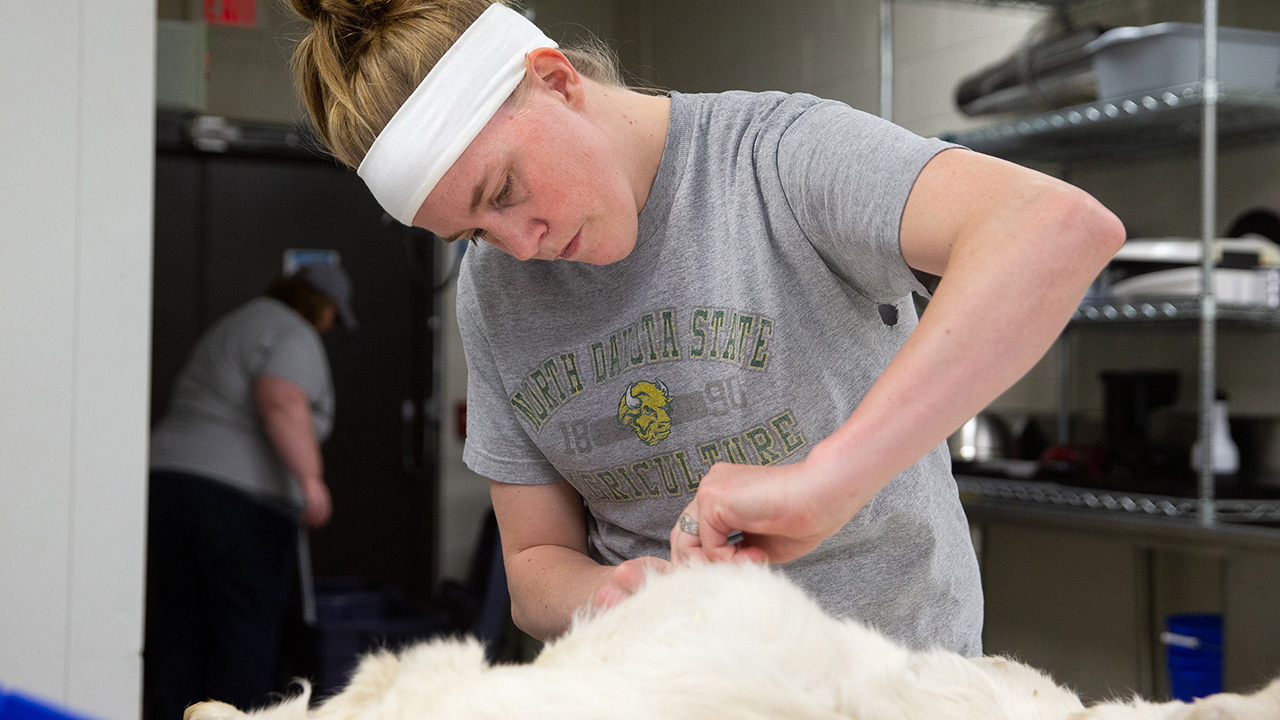
Krista Eiseman has been interested in the field of animal science since she was old enough to walk. She grew up on a small dairy farm in south central Wisconsin, where her father milked Holsteins and raised crops, and where she developed a love for animals, especially calves.
She attended UW-Platteville and developed a particular interest in meat science after taking Principles of Meat Science and Meat Animal Evaluation with Dr. Denise McNamara. She earned her master’s degree from North Dakota State University, where she studied meat science and muscle biology.
“While in North Dakota, I worked with a lot of beef cattle and caught the ‘beef bug,’” said Eiseman. “I was hooked from that point on.”
Eiseman returned to UW-Platteville as assistant professor of animal science in 2017.
What drew you to come back to your alma mater to teach?
I have always loved UW-Platteville and the surrounding community. From the first day that I stepped on campus as a student, it felt like home. I was drawn to UW-Platteville because of the size of the animal science program and all of the great experiences that I had as a student. I wanted to help provide similar experiences to students at UW-Platteville. Specifically, I enjoy being able to use my experiences as a student at UW-Platteville in my own classroom.
What do you enjoy most about teaching?
The thing that I enjoy most about teaching is being able to connect with the students using my own personal experiences. I feel that students are able to connect with me and the material because I am able to provide my own personal connections to the material.
Along with this, I enjoy providing hands-on lab experiences and on farm tours for my students. These experiences provide an additional layer of understanding that the students can use to further understand production practices and management schemes from operation to operation.
One specific example is seeing the students improve their animal handling skills from the beginning of the semester to the end. Many students haven’t seen beef cows let alone handled them, so this is a big accomplishment.
What is the key to helping students be successful in your classes?
The key to helping students be successful in my classes is being available to answer questions and that it's okay to say, “I don’t know.” It is important that my students understand that I want them to be successful and in order to do that they need to ask questions. Many of the students in our programs do not come from a farming background like they did 10 or 15 years ago. One of the biggest challenges in our upper level classes is providing a basic understanding that production practices differ from farm to farm and state to state. It is important to keep in mind that not all farmers and ranchers are going to manage their cattle or plant their crops the same. What does matter is that the students are able to listen to and understand why farmers and ranchers may do things differently. All producers want to provide a high-quality and safe product to consumers; we just might do it a bit differently.
What are your research interests, and what research projects have you been involved with on campus?
My research interests include anything calf-related. I am specifically interested in the impact that stress has on health, performance and overall productivity of beef calves from birth through the feedlot. In addition, I am interested in vitamin and mineral supplementation strategies and their impact on animal health and productivity as well. During my time at UW-Platteville, I have worked to involve students in several class-based research projects through the Student Research and Engagement Funds program. I have had the ability to collaborate with several faculty members in the School of Agriculture, including Dr. Tera Montgomery, Dr. Pete Lammers and Justin Daugherty at Pioneer Farm. The added benefit of collaboration for the students is hearing and understanding different perspectives from those who have a different area of expertise than myself. The collaborative nature of many of our projects allows for a well-rounded, hands-on experience for our students in animal and dairy science.
What new developments or opportunities in the industry make this an exciting time for students to be in this field of study?
One of the biggest developments is the addition of the Dairy Innovation Hub. The hub provides funding to increase collaborative research opportunities between UW-Platteville faculty in partnership with other UW system researchers. These collaborative efforts are meant to provide vital research findings and data in order to keep Wisconsin’s dairy community at the forefront in order to provide nutrition products to consumers. In addition, the hub provides the ability for a larger number of undergraduate students to be involved in undergraduate research and hands-on experiential learning opportunities.
This opportunity, along with many other things makes it exciting to be a student studying animal or dairy science.